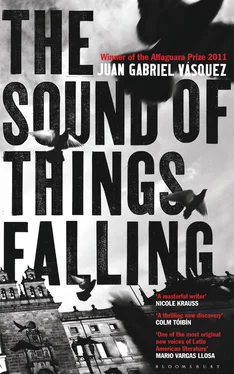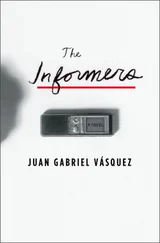Later, when all the guests had gone, Ricardo led her up to the room where they’d slept together for the first time, sat her down on the bed (swept aside the few wedding presents) and then Elaine thought he was going to talk to her about money, that he was going to tell her they couldn’t go anywhere on a honeymoon. He didn’t though. He tied a blindfold over her eyes, a thick cloth that smelled of mothballs that might have been an old scarf, and said, ‘From here on you don’t see anything.’ And so, blindly, Elaine let herself be led downstairs, and blindly heard the family’s goodbyes (she thought Doña Gloria was crying), and blindly went out into the cold night air and got into a car someone else was driving, and thought it was a taxi, and on the way to who knows where asked what all this was and Ricardo told her to be quiet, not to spoil her surprise. Elaine blindly felt the taxi coming to a stop and a window opening and Ricardo identifying himself and being greeted with respect and a big gate opening with a metallic sound. As she got out of the taxi, seconds later, she felt a rough surface under her feet and a gust of cold wind messed up her hair. ‘There are some stairs,’ said Ricardo. ‘Careful, take it slow, we don’t want you falling.’ Ricardo pressed her head as one does to keep someone from banging their head on a low roof, like the police do so their prisoners won’t bang their heads on the doorframes of the patrol cars. Elaine let herself be led, her hand touched something new that soon turned into a seat and she felt something rigid against her knee, and as she sat down an image came into her head, the first clear idea of where she was and what was about to happen. And it was confirmed when Ricardo started to talk to the control tower and the light aircraft began to taxi down the runway, but Ricardo only gave her permission to take off the blindfold later, after take-off, and when she did so Elaine found herself facing the horizon, a world she’d never seen before bathed in a light she’d never seen before, and that same light was bathing Ricardo’s face, whose hands moved over the panel and who looked at instruments (needles that were spinning, coloured lights) she didn’t understand. They were going to the Palanquero base, in Puerto Salgar, a few kilometres from La Dorada: this was his wedding gift to her, these minutes spent on board a borrowed plane, a Cessna Skylark that the groom’s grandfather had obtained in order to impress his bride. Elaine thought it was the best gift imaginable and that no other Peace Corps volunteer had ever arrived at their workplace in a light aircraft. A gust of wind shook them. Then they touched down. This is my new life , thought Elaine. I’ve just landed in my new life .
And it was. The honeymoon blended into the arrival at the permanent site, the first sanctioned shagging blended into the new volunteer’s first missions: the first steps towards extending the sewer system, the first meetings with Acción Comunal. Elaine and Ricardo allowed themselves the luxury, courtesy of her CEUCA class, to spend a couple of nights in a tourist inn in La Dorada, surrounded by families from Bogotá or Antioquia cattle ranchers, and during those days even had time to find a single-storey house at a price that seemed reasonable. The house — a clear improvement, now that they were a married couple, compared to the little room in Caparrapí — was salmon pink and had an overgrown, 9-square-metre patio that nobody had taken any care of for a long time and that Elaine immediately set about salvaging. She discovered that now, in her new life, mornings had taken on a new character, and she started waking up at first light just to feel the freshness of the air before the brutal heat began to devour the day. ‘I wash early in the morning with cold water,’ she wrote to her grandparents, ‘after all my griping about the cold water in Bogotá. We use a hollow gourd called a totuma to shower with. I’m sending a photo.’ In the first days she acquired something that would prove to be essential: a horse to take her to neighbouring villages. He was called Tapahueco, but Elaine found the name so hard to pronounce that she ended up calling him Truman, and he had three speeds: a slow trot, a fast trot and a gallop. ‘For 50 pesos a month,’ Elaine wrote, ‘a campesino looks after him for me and feeds him and brings him to me every morning at eight o’clock. I have blisters on my rear and every muscle in my body aches, but I’m learning to ride better all the time. Truman knows more than I do and is helping to teach me. We understand each other, and that’s what matters. With a horse a person learns to manage time better. I don’t have to depend on anyone and it’s cheaper. I’m not one of the Magnificent Seven, but I haven’t lost my enthusiasm.’
She also spent time making contacts: with the help of her predecessor, a volunteer from Ohio who was on his way home and who Elaine looked down on from the first moment (he had an apostle’s beard, but never took any initiative), she compiled a list of thirty notable locals: there was the priest, the heads of the most influential families, the mayor, the landowners who resided in Bogotá and Medellín, absent powers of a sort who had land but were never on it, and lived off it but never paid the taxes they should have: Elaine complained about this at night, in her matrimonial bed, and then complained that in Colombia all the citizens were political but no politician wanted to do anything for the citizens. Ricardo, who was now acting as if he knew it all, was openly amused and called her ingenuous and naïve and a gullible gringa , and after making fun of her and her pretensions to be a social missionary, a Good Samaritan for the Third World, he’d put on an unbearably paternalistic expression and sing, in a terrible accent, What’s there to live for? Who needs the Peace Corps? And the more annoyed Elaine got — she no longer found the song’s sarcasm amusing — the more enthusiastically he’d sing:
I’m completely stoned,
I’m hippy and I’m trippy,
I’m a gypsy on my own.
‘Go fuck yourself,’ she’d tell him, and he understood perfectly.
A couple of days before Christmas, after a long and frustrating meeting with a local doctor, Elaine arrived home dying for a shower to wash off the dust and sweat, and found they had visitors. The sun was setting and the faint lights of the neighbours’ windows were beginning to come on. She tied Truman to the nearest post and, going through the little garden, in the kitchen door, and while she looked for a Coke in the propane refrigerator the voices reached her ear. Since they came from the living room, and since they were male voices, she supposed that they were some acquaintances who’d shown up to ask the gringa for something. This had already happened on several occasions: Colombians, Elaine complained, thought the Peace Corps’ work was to do anything they couldn’t be bothered to do or found difficult. ‘It’s the colonial mentality,’ she used to say to Ricardo when they talked about the subject. ‘So many years of being used to other people doing things for them can’t be erased just like that.’ Suddenly the idea of having to greet one of these people, the idea of having to go through a series of banalities and ask about their family and children and get out the rum or the beer (because one never knew when that person might be useful in the future, and because in Colombia things didn’t get done through hard work but through real or feigned friendship), made her feel infinitely tired. But then she heard an accent in one of the voices, a vague tone that sounded familiar, and when she leaned round the corner, still unseen, she recognized first Mike Barbieri and then, almost automatically, Carlos, the harelipped man who’d helped them so much in Caparrapí. Then the men must have heard her or sensed her presence, because all three turned their heads at the same time.
Читать дальше












